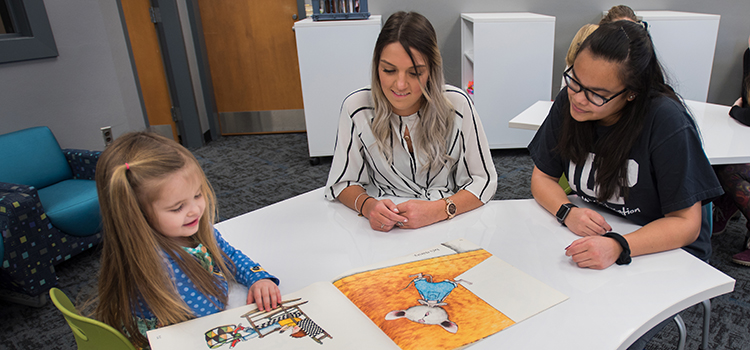
Teaching can be more than a career. It can be a calling, a way to help people today and leave your mark on tomorrow. Explore the many different pathways to becoming a teacher and learn about your options, from kindergarten through high school.
As you consider the subjects you might teach, you'll talk to advisors and build connections with other students who also want to explore the field of education.
First-Year Course Guidelines
Below, you'll find the typical first-year courses taken by students in Exploratory Education. Your courses may be slightly different, based on placement testing and courses you've already taken through dual enrollment or Advanced Placement (AP).
First Semester (Fall)
- DVST 160 Learning Strategies† (1cr)
- EDUC 281 Pathways in Education† (1cr)
- ECEX 111 Intro to Exceptional Persons OR Major Course (3cr)
- ENGL 101 OR ENGL 100 (based on placement) (3cr)
- SCI 105 OR Natural Science Elective - Lab Course (4cr)
- Dimensions of Wellness Course (3cr)
Second Semester (Spring)
- PSYC 101 (3cr)
- HIST 196 (3cr)
- Math 151 (3cr)
- Fine Arts Course (3cr)
- ECSP 112 Child Development or Major Course (3cr)
†Courses are part of the required First-Year Experience
Liberal Studies Social Science Electives to Consider Your First Year
Students must complete three alternatives in fulfilling social science requirements. Some may be required or strongly recommended by the major. Note that you may use a prefix only once. Courses marked (GMA) may also fulfill the Global and Multicultural Awareness requirement.
The following social science elective is recommended for potential Early Childhood, Middle Level, or Special Education majors: GEOG104 Geography of Non-Western World (GMA)
- ANTH 110 Contemporary Anthropology (GMA)
- ANTH 211 Cultural Anthropology (GMA)
- ANTH 213 World Archaeology
- CRIM 101 Crime and Justice Systems
- ECON 101 Basic Economics
- ECON 121 Principles of Economics I
- GEOG 101 Geography of Human Environment Interaction
- GEOG 102 Geography of US and Canada
- RGPL/GEOG 103 Global Cities: Issues in Planning and Development (GMA)
- JRNL 105 Journalism and the Mass Media
- PSYC 101 General Psychology
- PLSC 101 World Politics (GMA)
- PLSC 111 Power and Democracy in America
- SOC 151 Principles of Sociology
- SOC 231 Contemporary Social Problems
Highlights for Teacher Preparation
The path to teacher certification involves several steps throughout your college experience. In planning your freshman year, consider these highlights:
Pre-service Academic Performance Assessment (PAPA) Test
You must pass a series of Pre-service Academic Performance Assessment skills tests in reading, writing and mathematics. Usually, you will take these tests in one or two test sessions near the end of your freshman year or by the end of your third semester (before reaching 48 credits earned). You will have information on these tests, so you can figure out which areas you need to focus on when you study for them. Talk to your advisor about your SAT or ACT scores and whether they can count for this requirement.
- You should complete ENGL101 in your freshman year before taking the writing test. Review the standards of usage and sentence correctness and the scoring guide for the levels of proficiency you need for the test.
- The reading test emphasizes both literal comprehension and critical and inferential comprehension.
- If you scored below 60 on the reading exam, then you should enroll in DVST070.
- If you scored within the range of 60 - 77 on the reading exam, then you should enroll in DVST110.
- The mathematics test measures your ability to use mathematical skills in various applications. You should complete at least your first mathematics course before taking the test. Because math requirements vary, please discuss which math courses you need and when to take them with your adviser. You should not defer your math course(s). Every effort should be made to complete sufficient background in the freshman year.
Two Courses to Take Soon for Your Education Core
Two courses in the education core are available in the freshman or sophomore year. When seats are available, you should plan to take ACE 103: Digital Instructional Technology and EDSP 102: Educational Psychology, as required by your program.
Teacher-Education Majors Must Maintain a 3.0 Grade Point Average
You should give full attention to your academic performance from the very beginning. You are required to have a 3.00 grade average to be eligible for progress in the teacher education sequence and for state certification. You can't afford a slow start. There are many resources available at IUP to help you keep your grades up to this level. Get help from your professors or take advantage of tutoring and academic resources like the Writing Center.